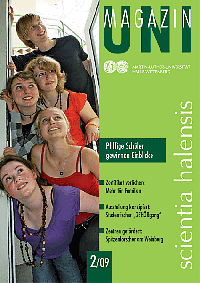Links
Contact
Ute Olbertz
phone: 0345 55 21424
ute.olbertz@rektorat.uni-ha...
Pressestelle der Universität
06099 Halle (Saale)
Login for editors
Campus Life
Removed from office, banished from the university
Between 1933 and 1945 at least 43 professors were suspended from the university in Halle – the majority because they were Jewish or politically undesirable. 80 years after the passing of The Law for the Restoration of the Professional Civil Service on 7 April 1933, the university is remembering its former members in an academic act on 27 November. A project group has researched the biographies of those who were dismissed and a commemorative book is being published for this occasion with the title “Ausgeschlossen” [Excluded].
Unforgotten injustice
Guido Kisch and Heiner Lück are connected by more than just the fact that Lück has held Kisch`s former chair at the University of Halle for nearly 20 years. Since his time as a student, Lück has been examining the biography of the Jewish legal scholar who was a professor in Halle for eleven years until he was banned from his profession in 1933. Today Kisch`s family are friends with Heiner Lück.
Two universities, two countries, two degrees
Halle and Milan offer a special master’s program: “European Integration and Regional Development” is a master’s program whose students come from two universities, study in two countries – Germany and Italy – and receive two degrees: a master of science and the “laurea magistrale”. A cooperation between MLU and Università Cattolica del Sacro Cuore in Milan is making this possible. Two students report on the programme – from an Italian and a German perspective.
From plants to human cells: Universal genetic scissors
It’s a battle for survival. Plants against bacteria. Your habitat, my habitat. And right in the thick of it: Dr. Jens Boch from the Department of Genetics. In 2009 he discovered how certain bacteria are able to genetically manipulate plant cells. Scientists the world over have been able to take advantage of this trick. They have developed innovative genetic scissors which can be used to find out about genetic diseases in human cells.
A Dialogue Between Subjects
“ScienceCampus Halle – Plant-based Bioeconomy” was officially opened in June. It unites the subjects agricultural sciences and agricultural economics, biology and biochemistry, and economic and social sciences. Without interdisciplinary cooperation it cannot work. What does it take to make this happen? Are there hidden risks alongside the opportunities? scientia halensis set off to find answers to these questions and had a look at the virtual campus as well.
“It’s a small world with IAESTE”
Internships abroad not only offer a glimpse of professional life. They also expand your view of the world. The organisation IAESTE finds technical internships all over the world and makes international work exchanges easier for students to access. Any students studying a scientific and technical subject can apply. In addition to finding internships for “outgoers” like Dorit Bennmann, who worked in Ghana, the programme finds internships in Germany for “incomers” like Michael Ainoo, who came to Halle from Ghana.
Researching amongst war and crisis
Research is not always a local issue. For a long time now, scientists have been on the move on every continent in search of answers. Sometimes they have to venture into uncertain territory. Scientific work becomes difficult in dangerous regions, and in places threatened by violence or military conflict, caution is the order of the day. Knowledge about a place is a top priority if incalculable risks are to be avoided. Two MLU scientists report on their experiences in Africa.
Overcoming language barriers by tandem
Li Shuo, Felix Keitel, Yanling Peng and Clemens Oerding have only known each other for a few weeks, yet they have already covered a lot of distance together. On a normal tandem bike that allows you to reach much higher speeds on flat surfaces than a normal bike does, the rider in front is called the captain because he steers. The rider in back is the stoker because it’s his job to pedal hard. However this tandem is not a normal tandem.
scientia halensis 2/2012
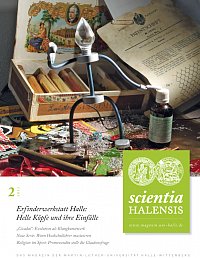
scientia halensis 1/2012
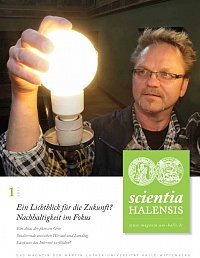
scientia halensis 4/2011
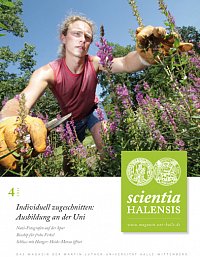
scientia halensis 3/2011
- The Japan Halle Connection
- Odour signals entice the enemy’s enemy
- Millions in funding for polymer research
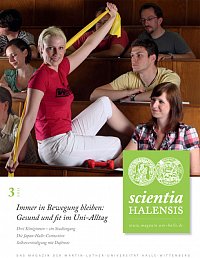
scientia halensis 2/2011
- Smaller degree programmes: rare and exotic
- Egyptian papyri – wound in protective nanofibres
- A new look for UniTV
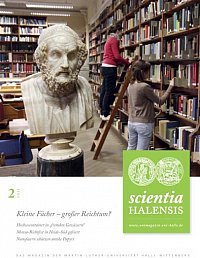
scientia halensis 1/2011
- Ageing Research: Topic of the Future and Chance for Halle
- Studying and volunteering at the shelter
- Why the Drosophila only has one posterior
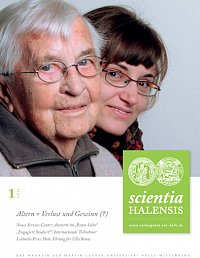
scientia halensis 4/2010
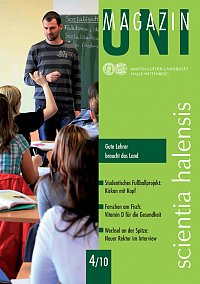
scientia halensis 3/2010
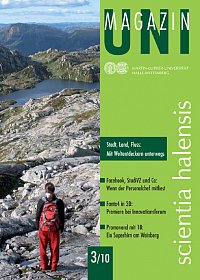
scientia halensis 2/2010
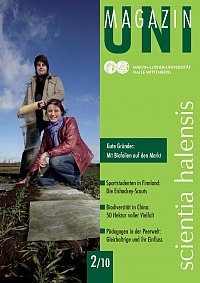
scientia halensis 1/2010
- Bacteria turn toxins into gold. Research findings causing a stir
- Experiencing Europe – Erasmus Office hoping to counteract downwards trend
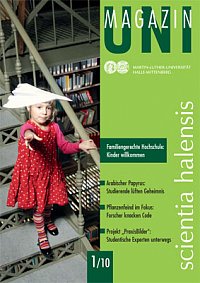
scientia halensis 3/2009
- Spider-Man silk from Halle
- Magdeburg Cathedral reveals its secrets
- Fertile Partnership – Senshû University Tokyo turns 130
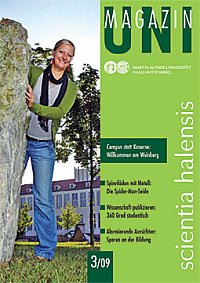
scientia halensis 2/2009
